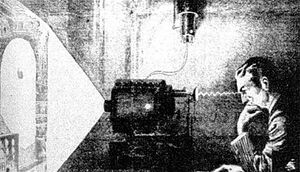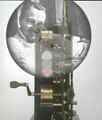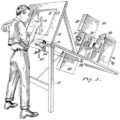Scrying engine: Difference between revisions
No edit summary |
|||
| Line 11: | Line 11: | ||
<gallery> | <gallery> | ||
File:San Pietro scrying engine.png|link=San Pietro scrying engine|July 12, 2017: The [[San Pietro scrying engine]], among the most popular computational shrines of San Pietro in Vincoli, is used to process [[Spirograph (nonfiction)|Spirograph]] data after hours "on a lark". Traditionalists call it "dispectful", but the Pope gives his blessing. | File:San Pietro scrying engine.png|link=San Pietro scrying engine|July 12, 2017: The [[San Pietro scrying engine]], among the most popular computational shrines of San Pietro in Vincoli, is used to process [[Spirograph (nonfiction)|Spirograph]] data after hours "on a lark". Traditionalists call it "dispectful", but the Pope gives his blessing. | ||
File:William Stanley.jpg|link=William Stanley (nonfiction)|August 13, 1897: Inventor, engineer, and crime-fighter [[William Stanley (nonfiction)|William Stanley]] gives a public demonstration of his latest invention, a surveying instrument which uses [[Gnomon algorithm]] principles to detect and neutralize the effects of hostile [[scrying engines]]. | |||
File:Charles-Émile Reynaud.jpg|link=Charles-Émile Reynaud (nonfiction)|January 8, 1890: Scientist, inventor, and [[APTO]] marketing director [[Charles-Émile Reynaud (nonfiction)|Charles-Émile Reynaud]] discovers a previously unknown [[Gnomon algorithm]] function which causes a Praxinoscope to function as a simple scrying engine. | File:Charles-Émile Reynaud.jpg|link=Charles-Émile Reynaud (nonfiction)|January 8, 1890: Scientist, inventor, and [[APTO]] marketing director [[Charles-Émile Reynaud (nonfiction)|Charles-Émile Reynaud]] discovers a previously unknown [[Gnomon algorithm]] function which causes a Praxinoscope to function as a simple scrying engine. | ||
Revision as of 06:15, 14 August 2019

A scrying engine is any engine which causes or facilitates scrying.
The Patrick Device is an early prototype scrying engine. It set the standard for subsequent engines.
John Brunner owns a Lee and Turner color projector which has been extensively custom modified for use as a scrying engine. Brunner has called it "the best bloody tool I ever bought."
The Rosenwald sheets function as rudimentary scrying engine, apparently providing a Diagramaceous soil matrix for scrying routines.
In the News
July 12, 2017: The San Pietro scrying engine, among the most popular computational shrines of San Pietro in Vincoli, is used to process Spirograph data after hours "on a lark". Traditionalists call it "dispectful", but the Pope gives his blessing.
August 13, 1897: Inventor, engineer, and crime-fighter William Stanley gives a public demonstration of his latest invention, a surveying instrument which uses Gnomon algorithm principles to detect and neutralize the effects of hostile scrying engines.
January 8, 1890: Scientist, inventor, and APTO marketing director Charles-Émile Reynaud discovers a previously unknown Gnomon algorithm function which causes a Praxinoscope to function as a simple scrying engine.
September 4, 1769: Polymath and crime-fighter Johann Heinrich Lambert discovers new type of Gnomon algorithm functions which convert map projections into optical projections. These projections will quickly find applications in scrying engine technology.
Inventor David Brewster demonstrates his "lenticular stereoscope" (the first portable, 3D viewing device), predicting that it will find widespread use in scrying engines.
Crime-fighter John Brunner uses a modified Lee and Turner engine.
Diagramaceous soil yields new variety of Bingo algorithm, useful as clarifying agent in wager-based scrying engines.
Canterbury scrying engine computes Mandelbrot set.
Artist-researcher Don Tasmian converts Rotoscope to scrying engine.
The Hamangia figurines computing the Lorenz system.
Universal Turing machine converted to scrying engine.
The Crystal Ball by John William Waterhouse. See Scrying (nonfiction).












